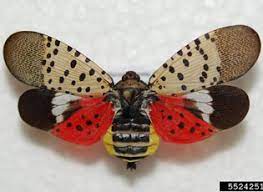Cybil Preston, State Apiary Inspector, MDA
Phone 410-841-5920, Fax 841-5835, Cell 410-562-3464
Goldenrod could be seen all over this Fall, on roadsides, field edges, meadows. It was wonderful to see so much of it in bloom, and the blooms seemed to come in early in some places possibly due to drought in some parts of the state. The smell emanating from the colonies has lingered from Mid-August through now, depending on where you are located.
I am seeing some "Fall Crash" or "Fall Dwindle” in the field! There are a surprisingly high number of mites in the brood cells while mite treatments are on or just were treated. Beekeepers are also having to do a follow up treatment after their typical fall brood/winter cluster treatments. If you are treating your colonies for varroa mites, please do a mite count prior to and a mite check after use of your varroa control to ensure that your varroa control method was effective. Also, if you have a very strong colony, still rearing high numbers of brood, a second mite treatment may be needed if the first treatment only brought the mite numbers down to threshold.
If these are strong colonies that are robbing weaker colonies, they can reinfect themselves with varroa from the weak colony. Another thing to check for after the varroa treatment is the brood pattern, before and after. Some varroa treatments can cause brood death and you also want to be sure the queen is still effective after your varroa control has been removed. Check for eggs and young larvae to ensure that your colony is still queenright.
Calls and emails are still coming into the MDA for sightings of what people think is the "Murder Hornet." 353 email and voicemail responses from our office so far this year! We do not have the Asian Giant Hornet here in Maryland and we are continuing to monitor for it. European Hornets are still an issue for beekeepers, though. I have seen an increase in beekeeper issues with the latter. Their presence is seemingly worse in apiaries that have had to do supplemental feeding. Make sure to reduce your entrances and feed internally if feeding is necessary.
Field Watch/Bee Check: This Voluntary beehive mapping tool is going strong. There are more beekeepers registered than any other crop!
Thank you to all the beekeepers that participated in the USDA/APHIS National Honeybee Survey. We were able to complete all 24-sample sites. AGAIN, thank you to all who were willing to participate. Anyone willing to participate in 2022, please let me know. You must have 8 colonies located in the same apiary to qualify. I appreciate your willingness to participate!
We continued the Invasive Trap Survey as well this year. We had traps at the Port of Baltimore, BWI Airport and a residential/industrial area.
Mack & Tukka are back to work. We have been training and preparing to get back into the field, and are working on scenting and stamina now. Maryland's AFB dogs will be back into inspections as soon as the weather hits 50 degrees F and below. We will work on commercial beekeepers moving to California first.
The invasive pest Spotted Lanternfly has been found in Kent, Cecil, Harford, and Washington counties. If you are moving bees in and out of these counties, please acquire a permit through MDA and continue to monitor and look for egg masses on your hives and equipment.
Robyn Underwood, a researcher at Penn State, is applying for a SARE grant to provide queen rearing classes for the 12 northeast states. These classes and training materials will cover all aspects of queen rearing so more northern queens can be produced. She is looking to show that there is a lot of interest in folks looking to attend queen rearing classes. If this is something you would be interested in, please email Robyn directly: rmu1@psu.edu.
I would like to see the local beekeeping clubs come together and start a dialogue on a few topics.
- Are beekeepers interested in getting Maryland code changed or rewritten to say or not say bees are considered agriculture? Are they livestock? Is there an interest in changing legislation? I would like the beekeepers via the local clubs to discuss this and see what the consensus of this topic is.
- I would love to see some written standards on nuc production and nuc sales. Would the beekeeping clubs set out some guidelines for the newbie beekeeper? I see a lot of variables when performing nuc inspections and I feel like there should be some guidelines on some standards of the nuc production, nuc sales or nuc brokering here in Maryland.
Apiary Inspection job openings. We will be opening the positions for Western Maryland, Central Maryland, and the Eastern Shore. I hope to get them open in December for spring 2022.
Mailing of the 2022 apiary registration form will be in December. Please update, sign and return your registration forms as soon as possible.

